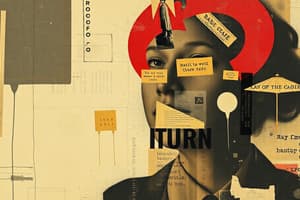Podcast
Questions and Answers
What does the opponent-process theory state?
What does the opponent-process theory state?
- Physiological responses occur before emotions
- When one emotion is experienced, the other is suppressed (correct)
- Emotions are independent of each other
- Cognitive appraisal is the first step in emotion
What is cognitive dissonance theory?
What is cognitive dissonance theory?
The theory that we act to reduce discomfort when two of our thoughts are inconsistent.
What does extrinsic motivation theory focus on?
What does extrinsic motivation theory focus on?
Motivation from external rewards like money, fame, or prizes.
What is incentive motivation theory?
What is incentive motivation theory?
What does James-Lange theory of emotion propose?
What does James-Lange theory of emotion propose?
What is the main assertion of Cannon-Bard theory?
What is the main assertion of Cannon-Bard theory?
What does the Schachter-Singer Theory state?
What does the Schachter-Singer Theory state?
According to Lazarus theory of emotion, what is the first step in an emotional response?
According to Lazarus theory of emotion, what is the first step in an emotional response?
What is the focus of Whorfian theory?
What is the focus of Whorfian theory?
What does the evolutionary approach of motivation emphasize?
What does the evolutionary approach of motivation emphasize?
What is drive reduction theory of motivation?
What is drive reduction theory of motivation?
What does optimum arousal theory suggest?
What does optimum arousal theory suggest?
What does the cognitive approach of motivation suggest?
What does the cognitive approach of motivation suggest?
Match the levels of Maslow's Hierarchy of Needs with their descriptions:
Match the levels of Maslow's Hierarchy of Needs with their descriptions:
What does incentive theory of motivation state?
What does incentive theory of motivation state?
What is self-determination theory?
What is self-determination theory?
What does expectancy-value theory explain?
What does expectancy-value theory explain?
What does psychoanalytic theory suggest?
What does psychoanalytic theory suggest?
Study Notes
Theories of Motivation and Emotion
-
Opponent-process theory: Proposes emotions occur as pairs of opposites, such as pleasure coupled with pain; suggests drug addiction arises from emotional pairing of pleasure and withdrawal symptoms.
-
Cognitive dissonance theory: Describes the discomfort felt when holding conflicting thoughts, motivating individuals to reduce this inconsistency.
-
Extrinsic motivation theory: Explains that motivation is driven by external rewards, such as money, fame, or prizes.
-
Incentive motivation theory: Asserts that behavior is motivated by reinforcements or incentives that encourage specific actions.
Theories of Emotion
-
James-Lange theory of emotion: Suggests that emotions are the result of our interpretation of physiological responses; an event triggers a physiological response, which is then perceived as an emotion.
-
Cannon-Bard theory of emotion: States that physiological arousal and emotion occur simultaneously and independently; an event leads to simultaneous emotional and physiological responses without requiring prior arousal.
-
Schachter-Singer Theory: Argues that both physiological arousal and cognitive appraisal are needed to consciously experience an emotion; an event elicits a physiological response that is interpreted as an emotion.
-
Lazarus theory of emotion: Emphasizes cognitive appraisal as the initial step in emotional responses, stating that interpretation occurs before physiological responses and emotions are felt.
Language and Motivation
-
Whorfian theory (Linguistic relativity): Proposes that language limits and shapes thoughts, influencing how individuals perceive and think about the world.
-
Evolutionary approach to motivation: Highlights the significance of species-specific instincts in governing behavior, suggesting behaviors are derived from evolutionary adaptations.
Theories of Motivation
-
Drive reduction theory: Posits that actions are motivated by the desire to reduce physiological arousal linked to unmet needs, such as hunger or thirst.
-
Optimum arousal theory: Indicates individuals seek to achieve and maintain an optimal level of arousal; pleasurable activities, like amusement parks, can enhance this state.
-
Cognitive approach to motivation: Suggests that motivation is influenced by individual thoughts, expectations, and personal goals, linking cognitive processes to behavior.
-
Maslow's Hierarchy of Needs: A structured framework outlining human needs from basic to advanced:
- Physiological Needs
- Safety and Security
- Relationships, Love, and Affection
- Self-Esteem
- Self-Actualization
-
Incentive theory of motivation: States that external incentives and rewards drive human choices and behaviors, emphasizing the importance of favorable outcomes.
-
Self-determination theory: Focuses on the positive aspects of intrinsic motivation and the detrimental effects of extrinsic motivation on personal growth.
-
Expectancy-Value theory: Suggests that the motivation to achieve a goal depends on an individual's expectations of success and the value placed on achieving that goal.
-
Psychoanalytic theory: Developed by Freud, posits that unconscious desires significantly influence human behavior.
Studying That Suits You
Use AI to generate personalized quizzes and flashcards to suit your learning preferences.
Description
Explore the key theories that explain how motivation and emotion function, including the opponent-process theory and cognitive dissonance. Understand the nuances between intrinsic and extrinsic motivation, as well as the physiological aspects of emotions through the James-Lange and Cannon-Bard theories. This quiz will test your knowledge of these fundamental concepts in psychology.




